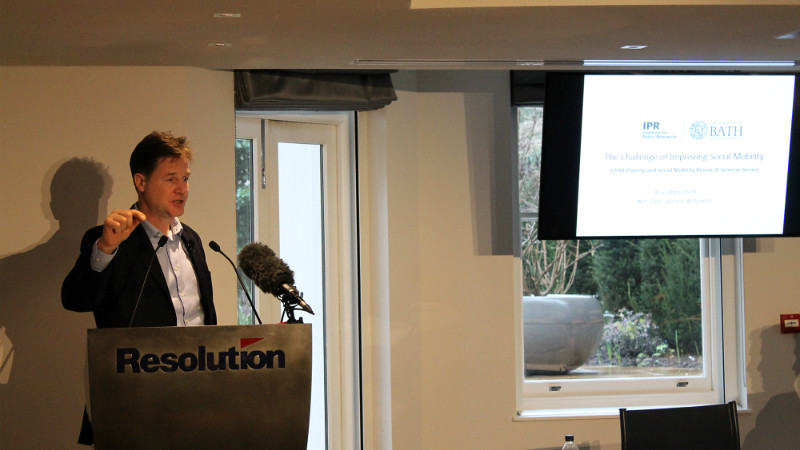On Monday 12 March, the University of Bath’s Centre for the Analysis of Social Policy (CASP) and the Institute for Policy Research hosted a one-day conference on social mobility. ‘The Challenge of Improving Social Mobility’ was the last in a series of ESRC-funded events coordinated by CASP and entitled Child Poverty and Social Mobility: Lessons for Research and Policy.
The first panel session, chaired by Social Mobility Foundation Chief Executive David Johnston, began with a presentation from Lindsey Macmillan, from University College London, on access to and progression in professional employment. She introduced her new project, which has a strong focus on helping employers to analyse their recruitment processes and identify where talented applicants from different backgrounds fall out of the system, and the barriers within firms that hinder the within-job progress of those less advantaged recruits who are appointed.
She was succeeded by three speakers representing employers: Malcolm Gomersall, a partner at Grant Thornton UK LLP; Matthew Coats, Chief Operating Officer at the Ministry of Justice; and Mark Jackson, EMEIA Lead at Fujitsu. All three shared the successes and challenges their organisations had faced in improving social mobility, and brought different perspectives to the conversation. Grant Thornton was number one on the Social Mobility Foundation’s 2017 Employer Index, and Gomersall revealed that this success had been supported not only by the company’s leadership, but also by clients and, most enthusiastically, by employees. He also emphasised the need for employers to collaborate and share best practice with one another. Coats explained that the Ministry of Justice had approached improving social mobility as an organisational change programme, developing a process that is systematic, data-driven and focused on impact. Finally, Mark Jackson outlined how Fujitsu is changing its recruitment process to be more inclusive: swapping out telephone for video interviews, prioritising experimental and group assessments and using purpose-built software to find the right candidates.
In the next session, Resolution Foundation Director Torsten Bell introduced former Deputy Prime Minister Sir Nick Clegg, who gave a keynote address on the challenges for social mobility. In his introduction, Bell looked at the course of the social mobility conversation in recent decades, with a particular focus on intergenerational mobility – a key component of political discourse throughout the 1990s. Using the Resolution Foundation’s own analysis, he demonstrated how outcomes had declined over the generations, with millennials facing the most difficult situation yet.
Sir Nick Clegg developed on Bell’s initial points by highlighting the increasingly fervent rhetoric of successive Prime Ministers on the subject of social mobility. Despite this apparent commitment, however, very little action had been undertaken; why the discrepancy? Sir Nick put forward two reasons: firstly the mismatched timetables of policy and politics, which encourage politicians to prioritise short-term goals in line with the electoral cycle; and secondly the fact that efforts to improve social mobility often upset some of the most powerful and influential groups in society. As an example, he discussed his work to implement universal school meals – a common-sense policy, in his view, that was nonetheless vociferously opposed by the vocal right-leaning elements of the print media.
Despite these challenges, however, Sir Nick delineated three routes towards improving social mobility. The first was to get the machinery of government right – ensuring that authority and responsibility are located in the right components of the overall governmental structure, embedding structures that are then preserved through successive regimes. The second was to overcome the British obsession with higher education – which eclipses further and vocational education – and the school years, which are promoted to the detriment of early years. The third route was via local government; Brexit, Sir Nick said, is paralysing Whitehall and this will not change anytime soon. There may however be an end in sight for the austerity-induced paralysis of local government, which will then be well-placed to encourage social mobility initiatives in the local context.
The University of Bath’s Professor Paul Gregg, who resigned from the Social Mobility Commission last year, chaired the final session of the day, in which Jo Blanden, University of Surrey, and Laura Gardiner of the Resolution Foundation shared their fine-grained analyses of the social mobility picture. Blanden’s work demonstrated that home ownership made a big difference to the achievements of successive generations – among other things, she revealed that 16-year-olds whose parents were owner-occupiers were £88,361.50 better off by age 42, on average. In the final presentation of the day, Gardiner explained why inheritance disproportionately benefits the wealthy – and therefore will not be the solution for redistributing wealth from the baby-boomer generations to the less advantaged millennials.
The day closed with some final thoughts from Professor Paul Gregg.

